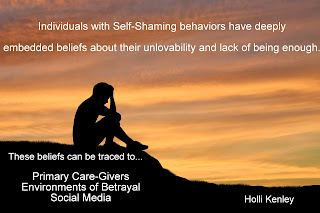From Self-Shaming To Becoming Enough: Week Four - It's Impact On Us

Week Four - Self-Shaming: Its Impact On Us For the past several weeks, we have been discussing “Self-Shaming.” In week one, "Self-Shaming: Increasing Our Understanding," we explored our Self-Shaming life-messages – the internal dialogue we say to ourselves about our lack of worth and value. In week two, "Self-Shaming: External Causes," we learned that the genesis of many of our Self-Shaming life-messages comes from Primary Care-Givers, Environments of Betrayal, and Social Media. However, in week three, "Self-Shaming: Internal Causes," we also learned that Self-Shaming life-messages evolve from Our Beliefs, Our Choices, and Our Unworthy Attachments. We acknowledged that there can be cross-over with any of the areas of causation. In order to get the most from this series, please read each of the articles and implement the Reflective Exercises at the end of each one. Then, join us here for “Self-Shaming: Its Impact On Us.” Let’s beg...


